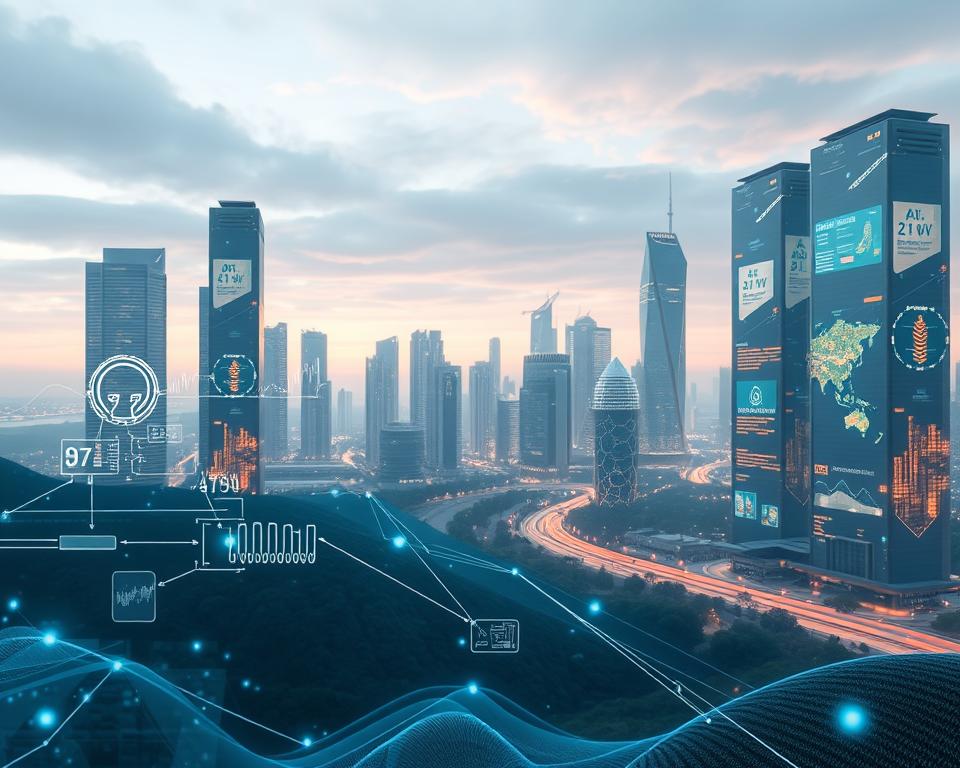
Cutting-Edge AI Advancements Coming in 2025
Did you know that by 2025, it’s estimated that AI will contribute up to $15.7 trillion to the global economy? This staggering statistic highlights the transformative potential of artificial intelligence as we move forward. As we approach 2025, the landscape of AI technology is evolving faster than ever, with cutting-edge AI developments poised to reshape industries and enhance everyday life. In this article, we’ll delve into the latest advancements in AI technology 2025, examining the trends and breakthroughs that are not only revolutionizing sectors like health care, education, and finance but also paving the way for innovations that will define the future of AI technology.

Key Takeaways
- AI is projected to add $15.7 trillion to the global economy by 2025.
- Cutting-edge AI developments are transforming industries.
- The integration of AI in health care is improving diagnostics and patient care.
- Education systems are harnessing AI to enhance learning experiences.
- The future of AI technology promises to redefine everyday tasks.
- AI is becoming critical for sustainability efforts worldwide.
Introduction to AI Advancements
The landscape of technology is evolving rapidly, driven by significant artificial intelligence trends. Understanding these trends is crucial for businesses and consumers as they navigate a world increasingly shaped by innovative ai solutions. These advancements are not merely theoretical; they have real-world implications across various sectors and industries.
Among the latest advancements in ai technology 2025, Natural Language Processing (NLP) stands out as a powerful tool that enhances human-computer interaction. This technology simplifies the way we communicate with machines, allowing for more intuitive responses and interactions. Enhanced machine learning algorithms are also at the forefront, providing systems with the ability to learn and adapt more effectively. Businesses leverage these capabilities to drive efficiency and innovation.
The practical applications of these technologies are awe-inspiring. For instance, in healthcare, AI systems enable faster diagnoses and personalized treatment plans. In finance, predictive analytics assist in risk assessment, streamlining operations. These examples illustrate how innovative ai solutions not only address current challenges but also lay the groundwork for future advancements.
Awareness of these emerging technologies empowers industries to adapt and thrive in a competitive environment. As artificial intelligence continues to evolve, staying informed about the latest advancements in ai technology 2025 will undoubtedly be beneficial for navigating the future.
Understanding Cutting-Edge AI Developments
The landscape of artificial intelligence is continually evolving, marked by cutting-edge ai developments that redefine technological capabilities. From the early days of rudimentary algorithms, AI has progressed to sophisticated neural networks, enhancing its potential for various applications.
At the core of these advancements lies machine learning and deep learning. These technologies empower AI systems by enabling them to learn from vast amounts of data, which is crucial for training effective models. Organizations like OpenAI and Google DeepMind play a significant role in pushing the boundaries of what AI can achieve, leading to breakthroughs that shape future artificial intelligence trends.
Data serves as the lifeblood of AI, fueling the training processes that allow systems to make informed decisions and predictions. As industries increasingly rely on these intelligent systems, understanding the mechanisms of cutting-edge ai developments becomes essential for navigating the future.

Latest Advancements in AI Technology 2025
As we approach 2025, the landscape of artificial intelligence is undergoing rapid transformation. The latest advancements in ai technology 2025 are set to revolutionize various sectors, highlighting key technologies that drive innovation and enhance performance. This section examines those cutting-edge ai developments that promise to reshape our interactions with technology and improve overall efficiency.
Key Technologies Shaping AI Innovations
Several key technologies are emerging as essential components in the advancement of AI. Enhanced computer vision is providing machines with the ability to interpret and understand visual data more like humans do. Natural language understanding is evolving, enabling AI systems to comprehend context and intent with greater accuracy. Real-time data analysis is becoming a vital tool for businesses, allowing companies to make immediate decisions based on current data trends.
The Role of Machine Learning and Deep Learning
Machine learning and deep learning remain at the forefront of cutting-edge ai developments. These technologies automate complex processes and refine accuracy, paving the way for inventive applications. For instance, AI-driven marketing tools provide businesses with personalized customer experiences based on data analysis. Edge computing is enhancing AI applications by processing data closer to where it’s generated, ensuring faster response times and more efficient operations.
| Technology | Description | Impact on Industries |
|---|---|---|
| Computer Vision | Allows AI to interpret visual data for applications in security, healthcare, and more. | Enhances surveillance systems and diagnostic imaging. |
| Natural Language Processing | Enables machines to understand and respond to human language. | Improves customer service through chatbots and virtual assistants. |
| Edge Computing | Processes data closer to the source for fast and efficient AI responses. | Facilitates real-time data analytics in manufacturing and logistics. |
The continuous improvements in these technologies mark significant steps towards achieving a more AI-integrated future, enhancing the capabilities of everyday applications in various sectors.
Artificial Intelligence Trends to Watch
The evolving landscape of artificial intelligence trends presents exciting opportunities for both businesses and individuals. One of the most notable trends is the rise of generative AI, which significantly enhances content creation and fosters innovation. This technology allows for the production of high-quality creative outputs, transforming industries ranging from marketing to entertainment.
Another crucial development involves the increasing integration of AI with Internet of Things (IoT) devices. This advancement not only improves communication among devices but also optimizes efficiency in various applications. As organizations leverage these technologies, the future of ai technology will increasingly focus on real-time data exchange, leading to smarter decision-making processes.
Ethical considerations are gaining traction within the realm of artificial intelligence. Many stakeholders emphasize the importance of ethical AI design and explainability to reduce bias in AI systems. This focus on transparency empowers users to trust AI-generated outcomes, paving the way for wider adoption across sectors.
Staying informed about these trends proves essential for businesses striving to maintain a competitive edge. Ignoring the advancements in artificial intelligence trends may hinder progress in a fast-paced digital environment.
Innovative AI Solutions for Businesses
As companies aim for efficiency and enhanced customer interactions, innovative ai solutions are proving to be crucial. These technologies not only streamline operations but also enhance decision-making processes across various sectors. The latest advancements in ai technology 2025 reveal practical applications tailored to the needs of modern businesses.
AI Applications in Industries
Several industries have embraced AI applications, demonstrating significant benefits:
- Retail: Corporations like Amazon utilize AI for demand forecasting and personalized marketing strategies, optimizing the supply chain and improving customer satisfaction.
- Manufacturing: Predictive maintenance powered by AI prevents machine breakdowns, leading to reduced downtime and cost savings.
- Finance: Financial institutions implement AI-driven algorithms for fraud detection, improving security and response times while minimizing risk.
- Healthcare: AI assists in diagnosing diseases with remarkable accuracy, enhancing patient care and operational efficiency in hospitals.
In addition, small and medium-sized enterprises (SMEs) can find cost-effective ways to adopt innovative ai solutions. Many cloud-based services offer scalable AI tools, making it accessible for businesses with limited budgets to leverage technology designed for growth. This democratization of AI creates opportunities for companies of all sizes to compete effectively in their respective markets.
Overall, the integration of AI technologies not only supports operational effectiveness but also helps forge stronger connections between businesses and their customers. Embracing these latest advancements in ai technology 2025 can prepare organizations for a more efficient and engaging future.
AI Technology Breakthroughs in Health Care
Recent advancements in the health care sector illustrate how ai technology breakthroughs are revolutionizing patient care and diagnostics. Leveraging artificial intelligence, medical professionals can access tools that enhance accuracy in diagnosing diseases and managing treatment plans. These innovations have the potential to dramatically improve outcomes for patients and streamline operations within health care systems.
Transforming Diagnostics and Patient Care
AI-assisted diagnostics stands out among the latest advancements in ai technology 2025. Advanced algorithms are capable of analyzing medical images with impressive precision, which facilitates earlier detection of conditions such as cancer. This technology allows health care providers to intervene sooner, often leading to more effective treatments and improved prognoses.
Moreover, predictive analytics plays a critical role in managing patient care. By evaluating large datasets, these systems can anticipate health issues before they arise, enabling proactive measures. Companies like IBM Watson have pioneered these efforts, developing solutions that empower health care professionals to deliver personalized care tailored to individual patient needs.
AI-enhanced drug discovery is another area significantly benefiting from technological breakthroughs. Processes that previously required extensive time and resources are becoming more efficient, allowing researchers to identify and create new treatments at an accelerated pace. Zebra Medical Vision is a key player in this arena, contributing to AI applications that improve diagnostic capabilities and overall patient care delivery.
The Impact of AI on Education
The integration of artificial intelligence trends into the education sector marks a significant shift in how students engage with learning. Personalized learning, driven by AI algorithms, tailors educational experiences to meet the unique needs of individual learners. This adaptation allows students to progress at their own pace, leading to better understanding and retention of information.
Innovative ai solutions, such as AI tutoring systems and adaptive learning platforms, offer educators tools to enhance their teaching methods. These systems provide real-time feedback and support, helping students grasp challenging concepts more effectively. Furthermore, the automation of administrative tasks allows educational institutions to allocate resources more efficiently, reducing the burden on overworked staff and improving overall operational efficiency.
Case studies from various schools and universities highlight the successful implementation of these technologies. Reports indicate increased student engagement, higher test scores, and a more positive learning environment. Despite these advancements, concerns regarding equity in access to AI technologies persist. Underfunded schools may struggle to provide the same level of resources, leading to disparities that challenge the ideal of equitable education for all students.
The discussion surrounding the transformative potential of AI in education remains vital. Balancing innovative ai solutions with considerations of equity ensures that all students can benefit from these advancements.
| AI Solution | Benefits | Challenges |
|---|---|---|
| AI Tutoring Systems | Personalized feedback and support | Access limited for underfunded schools |
| Adaptive Learning Platforms | Tailored learning experiences | Technology integration issues |
| Administrative Automation | Improved efficiency in operations | Initial setup costs |
The Emergence of Autonomous Systems
The advancement of autonomous systems represents one of the most exciting realms in the future of AI technology. With significant contributions from companies like Tesla, Waymo, and Amazon, the advent of self-driving cars and drones is reshaping various industries. These cutting-edge AI developments are not just about technological novelty; they promise substantial changes in safety, efficiency, and convenience for everyday life.
Self-Driving Cars and Their Future
Self-driving cars are hitting the roads with increasing frequency, thanks to sophisticated algorithms and machine learning techniques. These vehicles utilize a network of sensors, cameras, and real-time data to navigate complex environments. The transformation in transportation can lead to significantly fewer road accidents and a reduction in traffic congestion. As regulatory frameworks evolve, the integration of fully autonomous vehicles into everyday life seems more attainable.
Drones and Robotics in Everyday Life
Drones and robotics have begun to permeate sectors such as agriculture and logistics, demonstrating vast potential in streamlining operations. Agriculture drones assist in monitoring crop health, which aids in data-driven decisions for farmers. Meanwhile, delivery drones are revolutionizing logistics by ensuring packages reach their destinations more efficiently. The future of AI technology in these areas highlighted shows promise not merely in enhancing productivity but also in fostering sustainability.
Ethical Considerations in AI Development
As artificial intelligence trends evolve, so too do the ethical implications surrounding AI development. Concerns regarding privacy and data security come to the forefront, especially as cutting-edge ai developments play an increasing role in sensitive areas such as law enforcement and hiring practices. These applications necessitate a keen understanding of how algorithms make decisions, ensuring they do not perpetuate existing biases.
Transparent AI systems are critical for fostering trust and accountability. By mitigating biases, these technologies can uphold fairness in various contexts where they are deployed. Organizations such as the IEEE and the Partnership on AI advocate for practices that promote ethical AI development. These initiatives guide companies in creating frameworks that not only adhere to regulations but also prioritize the responsible use of AI.
Engaging in discussions about these ethical considerations is paramount. It involves recognizing the responsibilities shared by developers, corporations, and policymakers in shaping a future where artificial intelligence serves humanity positively and equitably.
Future of AI Technology in Everyday Life
The future of ai technology promises to integrate seamlessly into daily routines, enhancing convenience and efficiency. As the latest advancements in ai technology 2025 unfold, smart home devices will become more intuitive, allowing users to control lighting, temperature, and security systems with simple voice commands. Devices like Google Home and Amazon Alexa are set to evolve, anticipating user needs and preferences.
Wearable technology will also see significant improvements. Fitness trackers and health monitors will utilize advanced algorithms to provide real-time health data, potentially alerting users to medical issues before they become critical. The capability for these devices to interact with smart home systems will increase, fostering a more connected lifestyle.
Personal assistants will likely evolve beyond basic task management. Enhanced AI integration will allow them to organize complex schedules, automate repetitive tasks, and even suggest lifestyle adjustments based on user data. This evolution will not only improve efficiency but also contribute positively to work-life balance, helping individuals manage their time and priorities more effectively.
| AI Technology | Future Applications | Benefits |
|---|---|---|
| Smart Home Devices | Automated controls (lighting, security) | Increased convenience and security |
| Wearable Technology | Health monitoring and alerts | Proactive health management |
| Personal Assistants | Complex schedule management | Improved work-life balance |
The future of ai technology will undoubtedly enhance quality of life, making daily tasks easier and promoting overall well-being. These emerging technologies will not only streamline routines but also open avenues for richer, more fulfilling experiences in everyday life.
AI Technology Predictions 2025
The landscape of artificial intelligence is rapidly evolving, paving the way for exciting developments by 2025. One of the major ai technology predictions 2025 involves the integration of augmented reality (AR) with AI, which aims to create immersive learning experiences. This combination holds potential for educational sectors, enhancing engagement and facilitating deeper understanding of complex subjects.
Furthermore, the latest advancements in ai technology 2025 will extend into biotechnology. AI algorithms are expected to revolutionize drug discovery and gene editing, enabling faster and more precise results in healthcare. Companies like Alphabet’s DeepMind and IBM Watson are leading the charge in this innovative area, illustrating how AI can reshape our approach to biology.
The role of AI in decision-making processes is another key focus. Industries will likely see a significant shift towards data-driven strategies, with AI systems analyzing vast amounts of data to offer insights that humans might overlook. This evolution will facilitate improved efficiency and innovation, making businesses more competitive in various sectors.
A notable trend anticipated is the democratization of AI. By 2025, small businesses and local governments could easily access sophisticated AI tools, contributing to a broader range of innovations across communities. This shift has the potential to level the playing field, allowing those with fewer resources to benefit from advanced technologies.
| AI Predictions | Implications |
|---|---|
| Integration of AR with AI | Enhanced immersive learning experiences in education |
| Advancements in biotechnology | Faster drug discovery and precision medicine |
| Data-driven decision-making | Increased efficiency across various industries |
| AI democratization | Wider accessibility for small businesses and local governments |
Leveraging AI for Sustainability
The integration of innovative ai solutions into sustainability practices has taken off in recent years. Various industries are beginning to realize the potential of AI in tackling climate change and enhancing environmental health. Through the latest advancements in ai technology 2025, organizations can optimize their efforts to create a greener future.
Green AI Solutions
Innovative ai solutions are reshaping how companies approach sustainability. AI-powered algorithms can optimize energy consumption in smart grids, leading to significant reductions in waste. In agriculture, predictive analytics enables farmers to manage resources efficiently, enhancing yields while minimizing environmental impact.
AI also plays a pivotal role in developing sustainable supply chains. By leveraging real-time data, companies can partner with technology providers to track resources, reducing inefficiencies and waste. This level of insight streamlines operations and contributes to a healthier planet.
The potential for AI to facilitate circular economies is immense. Through intelligent forecasting and resource management, businesses can reduce landfill waste and promote recycling initiatives. Furthermore, AI technologies can bolster conservation efforts, providing vital support to projects aimed at preserving biodiversity and protecting endangered species.
| Green AI Solutions | Application | Impact |
|---|---|---|
| Energy Optimization | Smart Grids | Reduced energy waste and lower carbon footprint |
| Predictive Analytics | Agriculture | Improved yields with minimal resource use |
| Sustainable Supply Chains | Resource Tracking | Enhanced efficiency and waste reduction |
| Circular Economies | Resource Management | Less landfill waste and increased recycling |
| Conservation Support | Biodiversity Projects | Protection of endangered species and habitats |
Enhancements in Natural Language Processing
The field of Natural Language Processing (NLP) is experiencing transformative changes driven by the latest advancements in ai technology 2025. These innovations are reshaping how machines understand and interact with human language, paving the way for more intuitive communication between people and technology.
Pre-trained models like OpenAI’s GPT-4 and Google’s BERT have significantly contributed to cutting-edge ai developments. These models enhance language understanding and facilitate impressive capabilities in translation, sentiment analysis, and conversational AI. Such improvements not only increase accuracy but also allow applications to cater to diverse user needs.
Voice recognition technologies have found robust applications in customer support and virtual assistants. This progress showcases the versatility of NLP in practical use cases, from streamlining customer interactions to enabling more human-like conversations. Companies leveraging these technologies can enhance user experiences and build stronger customer relationships.
As NLP continues to evolve, its implications reach far beyond simple text processing. Advanced tools can now analyze and generate human-like responses, expanding the potential for integration in various sectors, ranging from retail to healthcare. These enhancements affirm the pivotal role of natural language processing in the landscape of artificial intelligence.
AI and Cybersecurity: A New Age of Protection
As cyber threats continue to evolve, the emergence of ai technology breakthroughs in cybersecurity offers a crucial advantage in protecting sensitive data. Businesses face increasing challenges from ransomware attacks and sophisticated data breaches. Innovative ai solutions are at the forefront of enhancing security frameworks and providing real-time defense mechanisms. Companies like Darktrace and CrowdStrike are leading the charge, employing intelligent systems that analyze patterns and detect anomalies in network traffic.
These advanced tools utilize machine learning algorithms that learn from historical data and continuously adapt to new threats. The ability to respond proactively can’t be understated; such systems can effectively identify vulnerabilities and mitigate risks before they escalate into serious issues. Organizations embracing these innovative ai solutions gain heightened visibility into their security posture, allowing for quicker and more informed decision-making.
The growing reliance on ai in cybersecurity is not merely a trend but a necessity in our increasingly digital world. As the landscape of cybercrime becomes more complex, innovative ai solutions emerge as vital components of comprehensive security strategies. By harnessing the power of ai technology breakthroughs, organizations can safeguard their data and bolster their defenses against the relentless tide of cyber threats.
| Company | AI Solution | Focus Area |
|---|---|---|
| Darktrace | Enterprise Immune System | Threat Detection |
| CrowdStrike | Falcon Platform | Endpoint Security |
| IBM | QRadar | Security Intelligence |
| Palo Alto Networks | AI-Driven Threat Prevention | Network Security |
Integration of AI with IoT Technologies
The convergence of artificial intelligence and Internet of Things (IoT) technologies marks a significant milestone in the latest advancements in ai technology 2025. This integration fosters smart environments, enhancing both user experience and operational efficiency. AI algorithms enable devices to learn from data, making them more adaptive and responsive to users’ needs.
Smart homes exemplify this integration, where AI-driven systems optimize energy consumption and enhance security. Connected vehicles leverage AI to analyze real-time traffic data, improving navigation and reducing travel times. In industrial settings, IoT sensors monitor equipment health, while AI facilitates predictive maintenance, minimizing downtime and repair costs.
Notable partnerships focus on developing smart cities, utilizing AI to sift through vast amounts of data from connected sensors to improve urban infrastructure, transport systems, and public safety. As these initiatives progress, they reflect emerging artificial intelligence trends that prioritize data-driven decision-making and real-time analytics.
| Application | AI Contribution | Benefits |
|---|---|---|
| Smart Homes | Energy optimization | Cost savings, enhanced security |
| Connected Vehicles | Traffic data analysis | Improved navigation, reduced travel times |
| Industrial Automation | Predictive maintenance | Minimized downtime, cost reduction |
| Smart Cities | Data management from sensors | Improved infrastructure, better public safety |
The Role of AI in Financial Technologies
Artificial intelligence is transforming financial technologies, a sector that increasingly relies on innovative ai solutions. Organizations like PayPal and Square use advanced algorithms to enhance user experiences and streamline transactions. These companies leverage cutting-edge ai developments to create secure and efficient financial platforms that meet the evolving needs of consumers.
Algorithmic trading methods utilize AI to analyze market trends and make decisions with incredible speed and accuracy. These systems can assess vast amounts of data, leading to optimized investment strategies that minimize risks. Furthermore, machine learning models play a crucial role in predictive analytics, making it easier for businesses to anticipate market fluctuations and adapt accordingly.
Fraud detection systems powered by AI algorithms greatly enhance security measures in financial services. By analyzing patterns in user behavior, these systems can identify anomalies and mitigate potential threats. Personalized financial services benefit immensely from AI, as it tailors recommendations to individual user preferences, ultimately fostering better financial management.
As AI technology continues to evolve, it promises to increase accessibility and efficiency in financial practices. The integration of innovative ai solutions not only simplifies processes but also enables customers to make informed decisions regarding their finances.
Conclusion
As we look toward 2025, the profound impact of the latest advancements in AI technology becomes increasingly evident. From revolutionary applications across various industries to the emergence of autonomous systems, it’s clear that AI is not just shaping our business landscapes but also enhancing our everyday lives. The future of AI technology promises unprecedented opportunities, emphasizing the need for both individuals and enterprises to remain adaptable and attuned to these trends.
Moreover, the ethical considerations surrounding AI development cannot be overstated. As we embrace these advancements, prioritizing responsible AI practices ensures that we harness its potential while addressing the societal impacts effectively. This balance between innovation and responsibility is crucial as we navigate the evolution of AI technologies.
In summary, the journey toward 2025 presents a vibrant tapestry of AI innovations. By staying informed about the latest advancements in AI technology 2025, we can not only foresee the changes that will affect our professional realms but also enrich our personal experiences. Embracing AI responsibly positions us for a future teeming with possibilities, driving positive societal impacts along the way.





